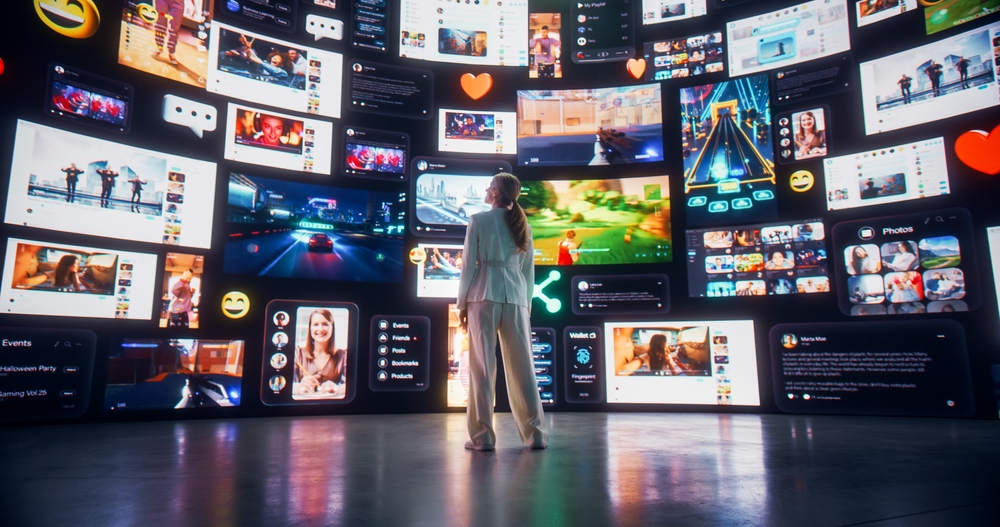The global multi-billion-dollar entertainment sector is constantly shaped by the latest emerging technological innovations, which have led to safer, more immersive, engaging, and interactive experiences.
Key technologies have also transformed the entertainment industry, especially the digital entertainment sector, in many other ways, which we will take a closer look at right here.
We will also discuss how today’s biggest interactive platforms will shape the future of entertainment for millions of people of all ages and backgrounds worldwide.
What are digital entertainment platforms, and how does cutting-edge technology shape them?
The umbrella term ‘digital entertainment platform’ describes various web-based platforms offering one or more digital entertainment forms.
For example, video-sharing websites like YouTube and other leading streaming sites like Netflix, Prime, and Disney+ are considered digital entertainment platforms. Online casino websites, which typically offer thousands of computer-generated and live dealer games for registered members (aged 18 or above) to play on their preferred devices, also fall into this category..
Metaverse platforms and traditional online gaming websites are also considered digital entertainment platforms, and some of the most famous examples that many of you may already be familiar with by now are the following:
- Fortnite
- Microsoft Xbox Live
- Nvidia
- Epic Games
- Meta
- Roblox
- Axie Infinity
- The Sandbox
- Decentraland
Social media platforms, such as TikTok, Instagram, X (Twitter), and Facebook, also fall under this umbrella term.
These platforms heavily rely on similar technologies to run smoothly and provide consistent, immersive, and engaging experiences.
These platforms also typically leverage other emerging technologies, such as artificial intelligence and machine learning, to provide users with more personalized/tailored experiences, which has helped elevate the digital entertainment industry and push the boundaries of what is possible in this sector.
Which other key technologies are helping to revolutionize digital entertainment platforms?
Today’s digital entertainment platforms require key technological innovations to run efficiently. The main technologies that have helped elevate this form of entertainment are the following:
- Faster internet speeds, cloud computing/gaming, and live streaming capabilities: Reduced lagging, latency, disconnection, and buffering issues. Users can now enjoy streaming their favorite content in full HD for hours without interruptions.
- Boosted performance: Today’s powerful mobile devices and PCs are now capable of handling even the more complex, high-end digital entertainment platforms
- Efficient web browsers and user-friendly websites: Platforms are more entertaining and appealing. Cross-platform technology also means people can easily pick up where they left off on their preferred devices.
- Blockchain technology and cryptocurrencies: Online gaming and other entertainment platforms are safer, and payments are more highly encrypted, faster, and lower-cost. Blockchain safeguards the very essence of online freedom and anonymity, and many experts say that this technology will continue to shape the future of the digital entertainment sector in various other ways.
- Artificial intelligence: Operators can personalize the experience for individual users like never before
- Virtual reality and augmented reality technology: Offer unique immersive experiences, and they are likely to become more mainstream over the coming years, shaping our favorite digital entertainment platforms in ways that we cannot yet imagine
Additionally, improved privacy policies, transparent data collection and usage practices, and enhanced cybersecurity measures found on today’s biggest entertainment platforms mean that users are safer than ever.
128-bit SSL (Secure Socket Layer), TLS (Transport Layer Security), and advanced firewalls to protect against DDoS attacks and other similar malicious threats are used to improve security. Transactions are far less likely to be hijacked. Personally identifiable information and preferred online payment method details (and any private chats with customer service agents, friends, and other users) are always securely protected.
Most digital platforms also leverage protective cybersecurity measures, such as One-Time Passcodes (OTP), to authorize payments. They also provide Two-Factor Authentication (2FA) secure login features, such as voice/facial/fingerprint recognition tools and OTPs, to gain access to our accounts, which prevents unauthorized access.
These modern technological innovations are helping to make these online environments safer for use and assisting operators to streamline their businesses and improve their products and services.
Major streaming platforms have opened up the world of entertainment for millions of people across the planet, making movies, TV shows, traditional video games, metaverses, classic casino games, videos, music, VR concerts, podcasts, social media, and other forms of digital entertainment far more accessible than ever.
What will the future of entertainment look like?
Based on the latest emerging technologies, recent shifts in trends regarding how we consume entertainment, and a change in our behavior, we can expect the future of entertainment to be more engaging, interactive, personalized, and immersive.
Users will have access to even more dynamic experiences they can share with others, and future content and recommendations/suggestions will be even more tailored than today. More advanced VR/AR capabilities will blur the lines between the physical and digital realms even further.
What’s around the corner?
The driving force that is poised to have the most significant impact on revolutionizing the entertainment industry of tomorrow is artificial intelligence, which will completely reshape this sector in ways that we cannot yet imagine.
With a continued willingness to embrace the latest technological innovations and respond quickly to the changes in consumer attitudes, the entertainment industry’s biggest digital platforms will help deliver far better experiences that will completely redefine the industry.
The industry has dramatically transformed in just a few short years, so it will be interesting to see what it will look like in just five or ten years from now, let alone twenty or more years.


